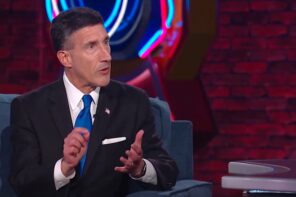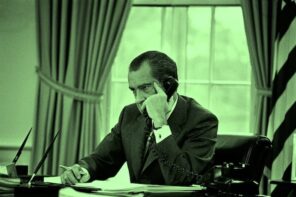Since 2016, I have been arguing here at RD that former president Donald Trump’s politics, and his appeal to White evangelical Christians, are best explained through the lens of authoritarianism. Pundits initially scratched their heads for entirely too long over how evangelicals could purport to follow Jesus and support Trump. The answer was always easy; he promised to do, and then did, what they wanted, which any disaffiliated former Christian school kid or survivor of evangelical homeschooling could have told any pundit or journalist who’d bothered to ask.
Since 2016, it’s become largely uncontroversial to view “Trumpism” as an American variety of authoritarianism, although the f-word, fascism, remains a point of contention. By contrast it has become, if anything, only more controversial to argue that Christianity itself can be, and often is, authoritarian. This sorry state of affairs persists despite the fact that the relevant polling data gathered since 2016 has only confirmed again and again that America’s White Christian churches are, more often than not, incubators of authoritarian politics.
Meanwhile, as PRRI data released this week confirms (again), secular Americans resist Trump and the Christian Right’s preferred policies at disproportionate rates. And yet, elite media gatekeepers continue to view church attendance as a social good, and secularism as dangerous and possibly responsible for American polarization—a position that amounts to pernicious nonsense.
In the service of what Lee Leviter has aptly dubbed “the myth of Christian innocence,” for the last eight years journalists, commentators, and scholars who should know better have tried everything they can think of to distinguish “real” Christianity from bigotry and authoritarianism. They’ve drawn arbitrary lines where (ostensibly) “real” religion ends and “politics” begins; they’ve cherry-picked data; and they’ve engaged in outright wishful thinking that contradicts the available data. They’ve even made a slick film that allows “good” (but very much anti-choice and anti-LGBTQ) evangelicals to distinguish themselves from their “bad” (i.e., Christian nationalist) coreligionists in order to paint “true” Christianity as inherently good.
Myths of innocence, for what it’s worth, are never harmless. And in the United States, the myth of Christian innocence directly harms nonreligious Americans and religious minorities, in addition to skewing our politics rightward.
Over the last couple of years, the American punditocracy has protected the myth of Christian innocence by suggesting and sometimes asserting—falsely—that support for Trump among White evangelicals comes primarily from self-identified, but largely disinterested White evangelicals who rarely or never attend church. The data have never supported this claim, but that hasn’t stopped it from spreading. In fact, early this year PRRI founder and president Robert P. Jones explicitly called out America’s so-called “paper of record,” The New York Times, for spreading this misinformation:
A version of this thesis appeared recently in a highly-circulated New York Times article, which made the bold claim that ‘Trump is connecting with a different type of evangelical voter’ beyond ‘the churchgoing, conservative activists who once dominated the G.O.P.’
Despite its zombie-like resurrections since Trump’s rise to power, the assertion that unchurched White evangelicals are the most supportive of Trump is not supported by the preponderance of evidence.
For a mild-mannered, consummately professional scholar and statistician of Jones’s caliber, “not supported by the preponderance of evidence” is the equivalent of what the kids call a “sick burn.” And Jones goes further, suggesting that journalists’ continued attempts to sell a narrative “despite the plain evidence to the contrary” stems from their subconscious drive to preserve “a deeply-held American assumption about the positive value of church.”
The actual facts are that, from 2016 through the 2020 election, White evangelicals who attended church frequently gave Trump higher favorability ratings than those who attended church less often or not at all. Indeed, as Jones notes, they did so by double-digit margins. Subsequently Trump’s favorability numbers among White evangelicals who attend church frequently and those who attend seldom or never converged at around 60% favorability, but Jones still concluded, “At best, church attendance may modestly blunt the appeal of Trump’s most xenophobic rants among White evangelicals, but it ultimately makes no difference in White evangelical support for his candidacy as president.”
The new PRRI data released on September 10 corroborates the connection between frequent church attendance and authoritarian attitudes, and not only among White evangelical Protestants. Applying both the classic Right-Wing Authoritarian Scale (RWAS) and the Child-Rearing Authoritarianism Scale (CRAS), PRRI found similar results for authoritarian tendencies in the American population—41% according to the CRAS, and 43% according to the RWAS. But authoritarian personalities are not spread evenly across demographics.
High authoritarian personalities are disproportionately clustered in the following groups: Republicans (67%), White evangelicals (54%), White Catholics (54%), those who adhere to or sympathize with Christian nationalism (74%), and, importantly for the argument I’m making here, weekly churchgoers (55%). (These numbers are derived from the RWAS, but the CRAS data revealed the same broad pattern.) By contrast, there are far fewer authoritarians among Democrats (28%) and Americans who never attend church services (38%).
To be sure, not all frequent churchgoers are the same. Party affiliation, adherence to Christian nationalist beliefs, support for Trump, and race are clearly crucial factors with respect to American authoritarianism. Nevertheless, the notion that attending church has a moderating effect and should therefore be encouraged has, once again, been exploded by actual facts, as has the biased belief that America’s rapid secularization is bad for the country.
Those who oppose authoritarianism and value democracy have nothing to fear from the unfairly stigmatized nonreligious population, which now makes up nearly a third of Americans. In fact, they should be cheering for religious disaffiliation. Or, if they can’t quite bring themselves to do that, they should, at the very least, embrace American nones, atheists, and agnostics—nonreligious Americans—as a valid constituency that deserves a seat at the table in the public sphere.
Unfortunately, hegemonic Christianity and the legacy media’s efforts to protect Christian privilege make it more likely that we will instead continue to be treated like second-class citizens—at least where politics and the press are concerned. Still, as Founding Father John Adams famously said, “Facts are stubborn things; and whatever may be our wishes, our inclinations, or the dictates of our passion, they cannot alter the state of facts and evidence.” Perhaps someday the fact that active Christian practice is correlated with the authoritarian personality, and the fact of relatively low authoritarianism scores among the nonreligious demographic, will be acknowledged by elite pundits—maybe even in The New York Times.










